#Philippeaux
Explore tagged Tumblr posts
Text
On April 5, 1794, due to the execution of the Dantonists:
Rest in peace:
Camille Desmoulins, journalist, deputy to the Convention (34 years old) Georges Jacques Danton, deputy to the Convention (34 years old) François Chabot, deputy to the Convention (37 years old) Philippe François Nazaire Fabre, known as "Fabre d’Églantine," deputy to the Convention (43 years old) Jean-François Delacroix (41 years old) Marie-Jean Hérault de Séchelles, deputy to the Convention (34 years old) Claude Basire, deputy to the Convention (29 years old) Joseph Delaunay, deputy to the Convention (41 years old) Pierre Philippeaux, deputy to the Convention (39 years old) Marc René Marie d’Amarzit de Sahuguet (41 years old) Junius Frey (40 years old) Andrés Maria de Guzman (40 years old) François-Joseph Westermann (42 years old)
#frev#french revolution#camille desmoulins#georges danton#chabot#fabre d'Eglantine#Delacroix#hérault de séchelles#claude basire#Delaunay#Philippeaux#Sahuguet#Junius Frey#Guzman#Westermann#rest in peace#deserve better#remember all the good and bad sides of the executed#even if some of the prisoners were mixed with the Dantonists while some did not know each other#plus Westermann is not a person I like#Don't know about Guzman Sahuguet#Frey and Delaunay#Interestingly#the Dantonists were apparently mixed up with Lhullier#close to Hébert#who was acquitted.
58 notes
·
View notes
Text
Robespierre declares that he doesn’t believe Philippeaux deserves to be expelled from the Jacobins: 1, because he never was one; 2: because he never professed the principles of the Friends of Liberty and Equality.
Robespierre at the Jacobins January 7 1794

64 notes
·
View notes
Text
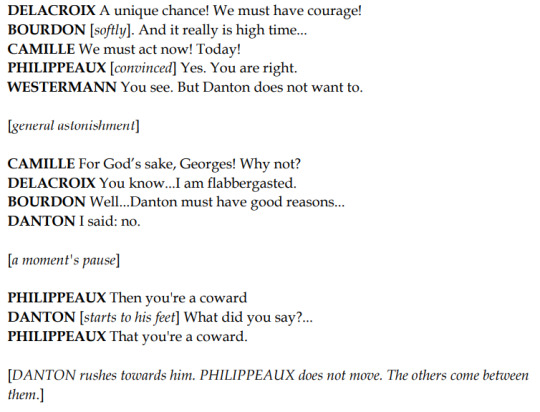
Philippeaux is the real chad here.
-from "The Danton Case" by Stanisława Przybyszewska
#the danton case#Stanisława Przybyszewska#Przybyszewska#frev#danton#philippeaux#desmoulins#l'affaire danton#french revolution
15 notes
·
View notes
Text
Let's see, myself, Fabre, Delacroix,Hérault de Séchelles, Westermann, Philippeaux, Georges, of course and many others.
does anyone have a list on all of the indulgents/dantonists other than whos mentioned already, thanks
12 notes
·
View notes
Photo

Is there such a thing as a "real life" phantom island? If there is, Isle Philippeaux qualifies. Until the 1820s, maps of Lake Superior placed a sizable island right in the middle of the lake. Mistaken double-mapping of Isle Royale is one plausible explanation for the error, but novelist Juliana Brandt found herself contemplating a supernatural explanation.
"What if this is an island that exists," Brandt said via Zoom from the Hastings, Minnesota, classroom where she teaches kindergarten, "and then it doesn't exist for some reason, but it'll come back — it's just this haunted place that pops in and out of existence?"
read more
19 notes
·
View notes
Text
let phillippeaux cook...
#philippeaux called out the excesses of the repressions#particularly those of carrier and collot#i was listening to bestie read revolutionary life in call and he mentioned uhh#and iw aslike YES SLAY#due to the situations he was put with the dantonists though </3
1 note
·
View note
Text
Excerpt of Przybyszewska's Danton Case, act II scene 2
DANTON: [...] Our blood will cease to nurture the soil of our borders. In a week's time you embrace those who are moaning today in the dungeons of the new Bastilles for daring to demand universal freedom. Fabre will fall into your arms-
PHILIPPEAUX:
[unexpectedly like a gunshot]
What ... that falsifier?!
CAMILLE: So you believe in this shameless slander, this satanic lie of the Committees?! Fabre! The dove-hearted poet!
Delacroix and Bourdon exchange a private smile.
11 notes
·
View notes
Text













Part 2 - The Indulgents + Lucille:
Hérault de Sechelles (always number one for me 😔)
Danton
Camille Desmoulins
Lucile Desmoulins
Pierre Philippeaux
Jean Francois Lacroix
Fabre D’Eglantine
ALSO if anyone can decipher what Herault’s address is, I’m having a hard time reading the script, I would be extremely grateful!

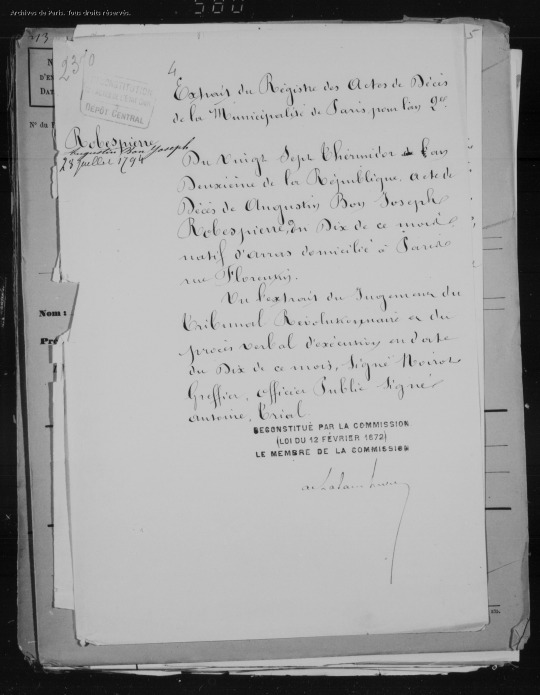

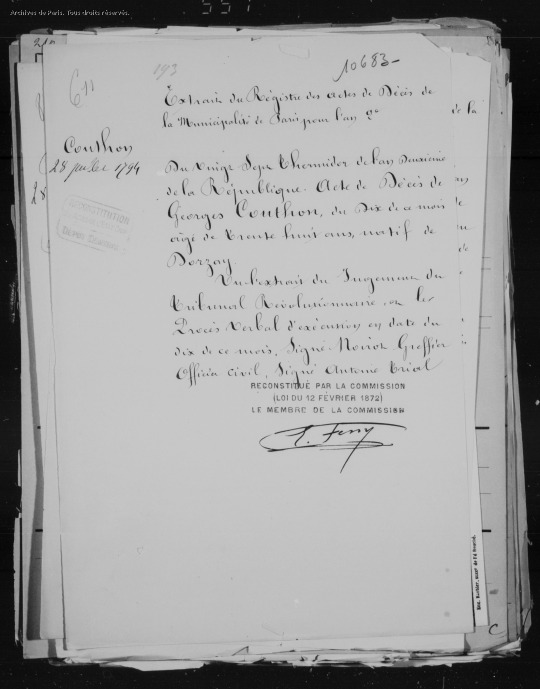

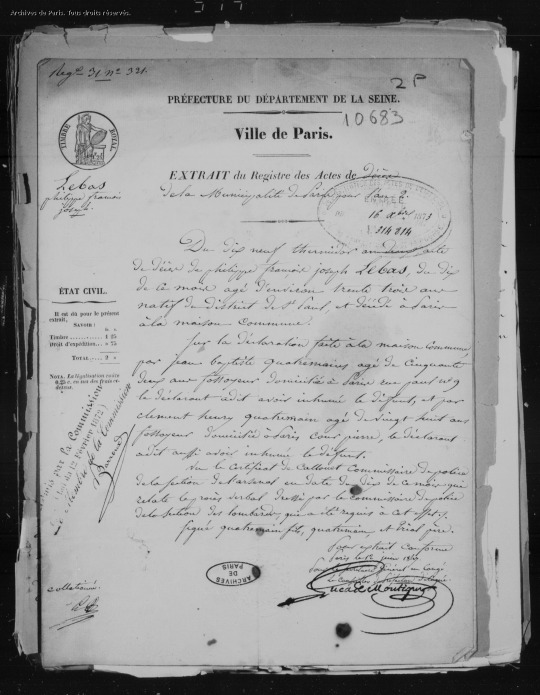
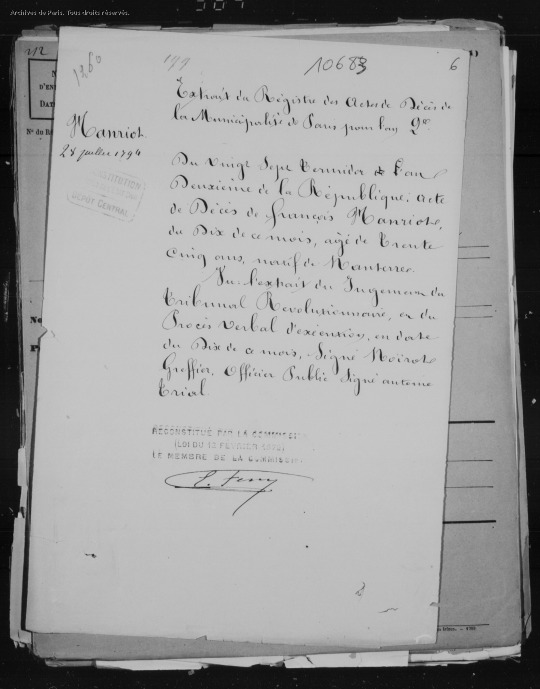
This stuff has probably already been uploaded and collated somewhere else, but I thought it was interesting enough to do my own post for anyone who might not have seen them!
The Paris Archives has several reconstructed "death documents" (Death certificates? Identification documents? Warrants? I have no idea what the right word would be here) for some of the key figures during the French Revolution.
The archive is a little complicated to search because an individual's documents are not always listed on the date of death, so I may have missed some of them.
I've divided them into three posts so that they're more organised:
The Robespierrists (hate using this word but I don't know how else to define them)
The Indulgents + Lucile
Miscellaneous
(Marie Antoinette and Louis XVI's (as Louis Capet) documents are also archived, but I'm not particularly interested in having them up here. But if you want their documents drop me a message!)
In this post:
Maximilen Robespierre
Augustin Robespierre
Saint-Just
Couthon
Le Bas
Hanriot
I'll post the link at the end!
81 notes
·
View notes
Text

Middle School Monday: Monsters in the Mist by Juliana Brandt
Glennon, his sister Lee, and their mother are spending the summer with Uncle Job at a lighthouse on Isle Philippeaux. Everything feels weird to Glennon here. He’s away from his home and his friends. He’s away from his father and his rules. And something about this island feels strange, but he can’t figure out what it is.
One stormy night, there’s a shipwreck down below the cliff, and the lighthouse keepers don’t seem concerned with helping the survivors. When Glennon meets those survivors, he begins to discover the island’s secrets. And the more he learns, the more he realizes that he and his family are in terrible danger.
This is a great story because of its plot, its setting, and its chilling atmosphere. But it’s an amazing story because of its many layers. On one level, it’s about a family that’s trapped inside a horror story. At the same time, it’s a story about family members who love each other and who need to fully trust and support each other in order to grow. And it’s also a story about a boy learning to trust and value himself, and who must rely on his mind and his instincts if HE is going to grow.
Give this book to older kids, teens, and even adults who are looking for scary stories and mystery stories with unusual settings. But also give it to any readers who would appreciate a book that seems to be one kind of story on the surface, but the more they read, the more it will open their minds and their hearts.
#Middle School Monday#Monsters in the Mist#Juliana Brandt#Kid Lit#mystery#horror#Kingsbridge Library#NYPL
2 notes
·
View notes
Text
The decrees concerning the discussion of the release of Ronsin and Vincent
Here are links to the parliamentary archives (unfortunately the texts are in French, impossible to translate them, I really don't have time, believe me I'm sorry) concerning the discussion relating to the request for the release of citizens Ronsin and Vincent, during the session of 14 Pluviôse Year II (February 2, 1794) as well as the reasoned discussion of Vadier who announces the impossibility of the Committee of General Security to present a report on the accusations brought against Ronsin and Vincent for lack of documents, during the session of 23 Nivôse Year II (January 12, 1794)
Which confirms my ideas: we know that it was Philippeaux and Fabre d'Eglantine who proposed the mention of arrest (especially Fabre) but let's be honest they are not the only ones responsible for their arrests, the majority of the CSP and the Convention who voted for are also responsible. The point is that contrary to the ideas of films of the French revolution Danton mostly let his colleagues speak for him (Desmoulins, Fabre, Philipeaux led the boat in the "faction" I put it in parentheses because it is more complex). Although we are at a time when Danton feeling condemned begins to go on the offensive (he has this in common with Hébert who backtracks in the most critical moments and sometimes lets Momoro and Ronsin lead the boat of the ultra revolutionary "faction") There is also as an ally of Danton Legendre who asks to speak. Bourdon de l'Oise is the one who is the most on the offensive against Vincent and Ronsin. To be fair Danton speaks out he asks for the release of Vincent and Ronsin in the same way as Fabre although it seems unfair to me for his colleague and ally Philippeaux (some would call Danton's attitude cowardly even if I find the word a little too strong). Interestingly, if Danton is applauded for his speech, the announcement of the release of Ronsin and Vincent is also applauded. This shows that the ultra-revolutionary faction is popular in Paris but still enjoys at this time a good respectability in the Convention although deputies are opposed to their release. Another most important point: the divergence of agreement between the Committee of General Security which announces not having found any pieces or evidence of accusation against Ronsin and Vincent and therefore in favor of their release (Vadier and Voulland) and some of the members of the Committee of Public Safety surely against . But to be fair Voulland and Vadier are for their releases but Bourdon de l'Oise is against the release (I think he was a member of the Committee of General Security) so there is a significant split. Another important point Levasseur announces that Mazuel, a Hébertist friend of Hanriot who would later be executed with Ronsin, Momoro, Vincent, Hébert and many others, had been arrested a first time on the proposal of Fabre d'Eglantine and was released very quickly. The Hébertists were therefore often attacked, which was not to help a possible reconciliation with the Committee of Public Safety (the Hébertists also have their share of responsibility, let's be honest I have the impression that all the "factions" and many deputies share the responsibility for these internal struggles)
The links:
Decree, proposed by Voulland, for the release of citizens Ronsin and Vincent, during the session of 14 Pluviôse Year II (February 2, 1794):
Discussion relating to the request for the release of citizens Ronsin and Vincent, during the session of 14 Pluviôse Year II (February 2, 1794)
Discussion motivated by the report of Vadier which announces the impossibility of the committee of general security to present a report on the accusations brought against Ronsin and Vincenzo for lack of documents, during the session of 23 Nivôse year II (12 January 1794):
What is interesting is that Vadier complains rather that the Basire, Chabot and Delaunay affair is rather very slow.
#frev#french revolution#vadier#georges danton#fabre#Philippeaux#ronsin#Vincent#Bourdon de l'Oise#Voulland
8 notes
·
View notes
Note
Do we have access to saint-just's personal letters if there any of them even exists? (I mean by personal is the letters he wrote to his family and relatives or friends etc.)
(The same question for robespierre, marat, camille, danton, desmoulins, the duplay family and other people from your personal choice if you find something)
We don’t have any complete correspondence from Saint-Just that I’m aware of, but some of his letters have been published within Oeuvres de Saint Just (1908) volume 1 (7 letters), volume 2 (2 letters). Of these, I would say the most personal ones are this letter SJ sent his brother-in-law in December 1791, congratulating him on his marriage, as well as this letter to Daubigny written the following year, which contains the (in)famous words: ”go and see Desmoulins, embrace him for me, and tell him I shall never see him again.” There’s also Lettres inédites de Saint-Just (five letters, half of which are work related and written while on mission) and Deux nouvelles lettres de Saint-Just à Garat (two letters). This last article includes the following letter, which I suppose also qualifies as personal:
Paris, July 8 Citizen and friend, It’s been a while since I’ve given you news of mine, nevertheless I have forgotten none of the testimonies of friendships that you’ve given me. When shall I have the pleasure of seeing you here again, the same time as last year when we saw each other? I have little leisure, I do what I can to respond to your trust and provided that I give an account of my moments to the people, friendship will not be more severe. I’m going to occupy myself with citizen Chassie, with the affair of citizen Bailli whom I pray you to assure of my most sincere attachment. If it pleases you, tell our common acquaintances that I have not forgotten them. I embrace your wife, your children and you. Saint-Just.
Aside from that:
Correspondance de Maximilien et Augustin Robespierre (1926) (I’ve already talked about in which letters you might find the most personal details in this old post)
La correspondance de Marat (1908) (not looked enough on this to say how many letters are personal and how many are strictly business related)
Correspondance de George Couthon (1872) (only work related letters as far as I’m aware, no letters to loved ones etc)
Correspondance inédite de Camille Desmoulins (1836) (quite a lot of personal details in the many letters Camille sent his father. English translations of letters to his father, Lucile and her mother can be found here. Here is also a long, personal letter Camille wrote in 1782, the oldest conserved one from him that I’m aware of.)
Danton — for being a ”main revolutionary” we have surprisingly few letters from him. All I know of at this point are presented in this post.
Duplays — the only personal Ietter I’m aware of is this one which Madame Duplay adressed to her second oldest daughter Sophie written 1793. Two letters from Robespierre to Maurice Duplay can also be found in the former’s correspondence.
Correspondance de Brissot (1912)
Lettres de Madame Roland (1900) Volume 1 Volume 2
Correspondance inédite de Marie-Antoinette (1864)
Lettres de Louis XVI: correspondance inédite, discours, maximes, pensées, observations etc (1862)
Memoirs, Correspondence and Manuscripts of General Lafayette (1837) Volume 1 Volume 2 Volume 3
Two cute letters from Philippe to Élisabeth Lebas, both from November 1793. Many letters from Lebas to his father can also be found within Le Conventionnel Le Bas… (1901)
Philippeaux’ three prison letters to his wife
#saint-just#robespierre#marat#desmoulins#danton#frev#ask#brissot#manon roland#louis xvi#marie antoinette#lafayette#philippe lebas#pierre philippeaux
53 notes
·
View notes
Text
Chorobliwa ciekawość nie pozwala mi oderwać oczu. W tym wszystkim są momenty naprawdę dające do myślenia, aktorzy wcale przekonujący, szczególnie Danton i Philippeaux - lecz pewnych transgresji Klacie wybaczyć nie mogę. Zarówno przeciwko prawdzie historycznej, jak i tekstowi Przybyszewskiej. Dramat polityczny komedią nie jest i komedią być nie może. Z elementów bluźnierczych, ale zabawnych: czarujący trójkącik Komitetu Ocalenia; ta zastygła w bezruchu hybryda Robespierre'a i Marata w otwierającej scenie; Legendre z gitarą; na pierwszym miejscu - bezdyskusyjnie - piły maszynowe w Konwencji, pomysł ponad wszelką wątpliwość rewelacyjny.
Tutejszy Desmoulins - to nieporozumienie, pierwotna jego kreacja była żałosna, owszem, ale nie groteskowa. Wprowadzona przez reżysera doboszka Marianna - ciekawa; mimo wszystko taki koncept prędzej pasowałby do "poważniejszej" interpretacji sztuki. Rudzielec Billaud-Varenne jest oprócz Philippeaux chyba najlepszy z postaci drugoplanowych. Warstwa muzyczna, przerywniki taneczne - zupełne faux pas. Wybór Saint-Justa przemilczę. Za takie zbrodnie gilotyna byłaby pobłażliwością. A Robespierre, bohater tragiczny w szekspirowskim tego słowa znaczeniu, niemalże nie pasuje do całej tej prześmiewczości... a raczej nie pasowałby, gdyby nie damsko-męskie prowokacje, które są bodaj gwoździem do licho zbitej trumny. Pośmiertne laury przyznaję za przytoczony cytat: "Cnota, bez której terror jest zgubny, terror, bez którego cnota jest bezsilna". Choć jedno odniesienie do rzeczywistej historii!
Nie powinienem był się spodziewać ani nadmiernej górnolotności, ani wierności oryginałowi. Mea culpa, towarzysze.
Ponoć mamy dzień języka ojczystego. Odnoszę wrażenie, że wśród moich obserwujących nie znajdę wielu rodaków, jeśli jacyś są w ogóle.
#Jednakowoż pozostaję ignorantem w dziedzinie teatru i sztuki w ogóle#Machine translate this if you feel so inclined
8 notes
·
View notes
Text
16 Germinal and aftermath, from the memoirs of Charles-Henri Sanson, executioner (English trans.)
Germinal 16 -- By the order of Citizen Fouquier, I remained in the vicinity of the Tribunal all day yesterday. The hall of justice was so crowded that I could not gain admittance. I arrived at nine o'clock this morning at the Conciergerie. As I passed the threshold, a gendarme tapped me on the shoulder, and said to me: ‘You'll have plenty to do to-day;’ and Riviere added: ‘They are all sentenced to death.’ He was mistaken, as I found out afterwards, for Citizen Luillier was acquitted. He was so inoffensive and obscure that no one thought of him. Richard's lodge was crowded with people who wanted to see the prisoners. As I was crossing the courtyard, Wolf, one of the clerks, told me to follow him upstairs. Citizen Ducray and two other clerks were writing; and Fabricius Paris, the head clerk, was walking up and down the room. His eyes were very red; he was deadly pale, and he trembled like a leaf. When he saw me, he said: “I am going away.” Ducray turned round and said: ‘Will you sign?’ ‘No, no, once more,' replied Citizen Fabricius; ‘I would rather burn my hand than sign.' He went away with tears in his eyes. I was not surprised, for I knew him to be a great friend of Danton's, and his pluck pleased me. Fouquier-Tinville, who is a cousin of Desmoulins, had not the same scruples. Lescot-Fleuriot, deputy-prosecutor, and two other functionaries, entered the room. Lescot asked me whether my carts were ready. I replied that they were. He then ordered me to go down and wait, which I did.
I had been waiting for a considerable time, when a gendarme came to tell me that I was wanted by Fouquier-Tinville. I found a good many persons in his closet — old Vadier, Amar, Coffinhal, Arthus, Herman, among others. Although Fouquier was present, I received the order of execution from the hands of Lescot. He told me that the convicts had rebelled against the Tribunal; that they would probably offer new resistance; that to prevent any mishap they would be introduced one by one; that I should have to seize them immediately, and pinion them. Fleuriot added that if the convicts attempted to excite the people on their way to the scaffold, I was to go at a trot, and make all haste. He also recommended extreme celerity in the execution itself, observing that the sooner the ‘ruffians' died the better. After this, a discussion arose as to the number of carts required. I had ordered three out. Lescot said that one was sufficient, and Coffinhal observed that only one should be used. I objected to this, and obtained two carriages.
I then proceeded to the parlour, which was full of gendarmes and soldiers. They formed two thick ranks. Half-an-hour elapsed before one of the convicts appeared. This was Chabot. He looked very ill. He was surprised at finding himself alone, and murmured: ‘Where are the others?' He was pinioned, and his hair was cut. Bazire was the next to appear. Chabot rose, and, running up to him, exclaimed, with tears in his eyes: ‘My poor, poor Bazire, it was I who brought you to this!’ Bazire pressed him in his arms, without a word of reproach.
The two Freys, Delaunay, member of the Convention, the Abbé d'Espagnac, and Disderiksen were led in after Bazire. After these, Philippeaux, Lacroix, Westermann, and Fabre d'Eglantine, Two turnkeys supported the latter, who was ill. During the toilet, Fabre said he wished to speak to Fouquier. One of my assistants called a clerk, who said this was not possible. Citizen Fabre then became angry, and cried : 'You ought to be satisfied with murdering me, and not steal my property! I publicly protest against the infamy of the members of the Tribunal, who have stolen from me a MS. comedy, which had nothing to do with the trial.' Lacroix and Philippeaux were calm.
Fabre was still speaking when a noise was heard in the passage. We recognised the voice of Citizen Danton, and there was a dead silence. His words came out like a torrent. I distinctly heard him say to the clerk who wanted to read out his judgment: ‘Be d — d, and your judgment with you! I won't listen to it! What a farce!' He thundered away, and all seemed to recoil before him. But when he saw the other convicts, his demeanour altered completely. He assumed a cold, indifferent air, and calmly walked up to me. He sat down, and tore away his collar, saying: 'Do your duty, Citizen Sanson.' I cut his hair myself. It was thick and hard like a mane. Meanwhile he went on speaking to his friends: ‘This is the beginning of the end; they'll guillotine the representatives wholesale. Committees governed by a Couthon without legs, and a Robespierre…. If I could leave them mine, they might go on for some time….But no; France will awake in a cesspool before long.' Shortly after, he exclaimed: 'We have accomplished our task. Let us go and sleep.'
Citizens Hérault de Séchelles and Camille Desmoulins were led in next. The former gave no sign of emotion; the latter spoke of his wife and child in heartrending terms. As soon as he saw us, he was seized with a tremendous fit of rage. He rushed upon my assistants, and struggled with them like a giant. All his clothes were torn in the scuffle. Four men had to hold him down on the chair. His friends tried to soothe him — Fabre with soft words, Danton with a tone of authority. The latter said: 'Leave these men alone! What's the use of fighting with the servants of the guillotine? They are only doing their duty. Do yours.'
At length everything was ready. Ducray headed the cortége. The members of the Convention and General Westermann occupied the first cart, in which I and Henri sat down also; four assistants were in the second cart with the other convicts. The escort was as numerous as that provided for the Queen and the Girondins. Danton stood in the first rank, behind me; next to him was Hérault de Séchelles; Fabre, Camille, and Philippeaux were behind. Chabot was the only one who sat down. He had tried to poison himself, and suffered much. Bazire stood next to him, and spoke to him words of tender friendship.
As the carter whipped his horse Danton exclaimed: ‘The idiots! they'll cry "Long live the Republic!" In half-an-hour the Republic will be without a head!' Fabre d'Eglantine was inconsolable about his comedy, which he said was in verse; upon which Danton laughed, and said to him: 'Verses! you'll have enough of them in a week, and we too.'
As we reached the quay, Camille Desmoulins became very furious. 'Do you not recognise me?' cried he; ‘The Bastille fell at my bidding! Come to my help, republicans! Do not let them murder us!'
His cries were received with groans. His fury increased, and we had to threaten to tie him to the side of the cart if he did not remain still. Danton, who clearly saw that the people who surrounded them would not rise to free them, said to Camille in a strong voice: ‘Be quiet, be quiet ! do not hope to soften this vile rabble.' And Lacroix: ‘Be calm; think rather of commanding respect than of exciting pity.'
Danton was right: there was no hope for them. The escort was surrounded by the usual attendants of the guillotine, and they shouted so that it was impossible for the public at large to hear what the prisoners said.
Passing before a cafe we saw a citizen, seated on a window-sill, who was drawing likenesses of the prisoners. The latter looked at him, and murmured: ‘David, David!' Danton raised his voice, and cried: 'Is that you, valet? Go and tell your master how soldiers of liberty can die.' Lacroix also spoke to him violently. David went on drawing. Doors, windows, and shutters were closed in Duplay's house (where Robespierre lives). When the prisoners saw the house, they aimed sarcasm over sarcasm at its walls. ‘Vile hypocrite!' said Fabre. ‘The coward is hiding himself, as he hid on August 10,’ cried Lacroix. Danton's voice rose louder than any. His face was purple, and his eyes glistened like burning coals. 'You shall appear in this cart in your turn, Robespierre,' he exclaimed, ‘and the soul of Danton will howl with joy!'
Danton was the same to the last: passing without transition from the most violent anger to the greatest calmness; at times brutal, at others sarcastic, and always firm. As we came in sight of the scaffold his colour slightly altered. The attention with which I looked at him seemed to displease him, for he elbowed me roughly, saying: 'Have you not a wife and children?' I replied that I had. He then resumed with impetuosity: 'So have I. I was thinking of them.' And I heard him murmur: ‘My wife, I shall not then see you again! My child, I shall not see you!' But a few seconds after he was himself again.
Delaunay, Chabot, Bazire, the two Freys, Gusman, Disderiksen, and D'Espagnac died first. When Camille Desmoulins was on the platform he asked me to do him a last favour, which was to take a lock of his hair and send it to his mother-in-law. He then stepped towards the weigh-plank without resistance. Fabre, Lacroix, Westermann, Philippeaux suffered next. Westermann cried several times, 'Vive la République!' Hérault de Séchelles came next, and Danton with him, although he was not called. My assistant had already seized Séchelles, when Danton advanced to embrace him. But it was too late. Danton looked on while his friend was being executed, with such coolness as does not belong to man. Not a muscle in his face moved. He seemed to defy not only the fear of death, but death itself. The weigh-plank was hardly lowered when he advanced. I advised him to turn round while the body was being removed. He shrugged his shoulders contemptuously. ‘Do not forget to show my head to the mob; they have not often seen one like it!'
When, according to his last wish, Danton's head was shown, there were cries of 'Vive la République!' but not many.
The cemetery of La Madeleine, where are the King, the Queen, and the Girondins, having been closed, the fifteen corpses of the Dantonists were taken to the small cemetery which has just been opened near the Barrière Monceaux.
I went to the Palace of Justice to take orders for tomorrow. Met Desboisseaux and Vilate, two jurors. They wanted to know how Danton had died. I related what I had seen. 'It is not astonishing; he was drunk,’ exclaimed one of them. I assured them that Danton was not drunk at all; upon which they called me a traitor and a blackguard, and went away in a passion.
Germinal 17 -- I did to-day what Citizen Desmoulins asked me. I got the address of his father and mother-in-law, at his house in the Rue de la Comedie, and went to No. 17 Rue des Arcs. Of course I did not go up. I sent for the servant, without telling her who I was, and said that, being present at the execution of Citizen Desmoulins, he had asked me to hand a locket to the mother of his wife. I then departed; but I soon heard steps behind. The servant came up, saying that Citizen Duplessis, Camille Desmoulins’ father-in-law, wished to speak to me. I answered that I was in a hurry, and that I would return another day. But at that moment Citizen Duplessis himself came up. I told him what I had said to the girl. He answered that I must have something more to say to him; and he insisted so much that I could not but follow him. He lived on the second floor. We entered a richly-furnished room. He showed me a chair, and sat down. Hearing the cry of a child, I turned round and saw a cradle in the corner of the apartment. Citizen Duplessis ran up to the cradle, and took out a child, who looked unwell. He showed him to me, and said: ‘It is his son.’ He kissed the baby, and said, with an effort: 'You were there — you saw him?' I nodded my assent. ‘He died like a brave man — like a republican, eh?' I answered that Camille's last words had been for those he loved. After a pause, he suddenly turned pale, and wringing his hands: 'And my poor daughter, my Lucile!' he exclaimed; ‘will they kill her, as they killed him?' And he expressed his grief in heartrending terms. A cold shudder crept over me. M. Duplessis walked to and fro, clenching his fists. As he was passing before a bust of Liberty on the mantelpiece, he threw it down, and furiously broke it to pieces. I was grieved and awed, and found no words of consolation for the poor old man. There was a ring at that moment, and an elderly lady, whose handsome face was pale with despair, entered and threw herself into the arms of Citizen Duplessis, crying: 'Lost! she is lost! She is to appear in three days before the Tribunal.' It was Madame Desmoulins' mother. I was seized with terror at the thought that I might be recognised by a woman in the loss of whose happiness I had a finger; and I ran away, as if I had committed a crime.
….
Germinal 20 -- Desmoulins' wife is at the Conciergerie with her so-called accomplices. They are to appear tomorrow before the Tribunal, with Citizen Chaumette and several others.
#frev#french revolution#16 germinal#charles-henri sanson#sanson#danton#camille desmoulins#herault de sechelles#idk what to tag this im just crying i dont even know
52 notes
·
View notes
Text

Welcome to the 1-year anniversary issue of Got The Look magazine! With new models and pictures and some of our blast from the past models with the most talked about and enjoyed photos of the last year!
It is available at: https://www.magcloud.com/browse/issue/2479348
With-
Front Cover:
Anne
Back Cover:
Anushka Pal
Featuring:
Carolyn Phillips
Molly Roxx
Anushka Pal
Leticia Alatriz
Anne
Emily Sahlén
Francisca Alatriz
Niko Wetherington
Miss Malibu Nikki
Marie Håkansson
Tawna Kelley
Sagine Philippeaux
Lunden De’Leon
Shayla Amber
Kerrie Eyman
Catherine Cornaby
Ty Berry
Joselyn Serrato
Tina
Bad Kitty Lulu
Vixen Von Raven
April Delaet
Dope The Model
Chrissy D
Shanaya Kanade
Precious Anode
Em
Kemm London
Sage Meyers
Lele Nichole
Got The Look is a Molly Roxx Universe publication.
0 notes
Text
MONSTERS IN THE MIST

Writing in a distinctly metaphorical vein, Brandt tells a tale that is chilling on more than one level. Accepting an invitation she claims she received, 13-year-old Glennon McCue’s mother has brought him and his emotionally fragile sister, Leeunah, to stay with their Uncle Job, a lighthouse keeper, on remote Isle Philippeaux while their father is away for a fall semester fellowship. Readers will quickly cotton to the fact that all is not right—either on the island or in the McCue family—as, along with fogs, oddly localized gales, feelings of formless dread, frequent encounters with staring rats, and like atmospheric portents, both Glennon and Lee exhibit clear signs of PTSD. Brandt piles on further clues to what’s going on: On the one hand, there are sightings of gruesomely disfigured specters and the ominous news that the island is completely cut off from the mainland, and on the other, there are Glennon’s memories of years of his mercurial father’s patronizing put-downs and sudden rages. In the wildly stormy climax, Glennon confronts multiple terrors as, to prevent him escaping with his family, the malign island attempts to sabotage his newfound determination through psychological means. The main cast defaults to White.
from Kirkus Reviews https://ift.tt/DbxkfwS
0 notes
Text
I found the following reported in Jules Claretie’s Camille Desmoulins and his wife (1876):
At the close of the night-sitting, which decided the arrest of Danton and his friends, Robert Lindet and the aged Ruhl — who moreover had not signed the decree for the arrest — warned him, through Panis. ”Danton,” said Doctor Robinet (Comment se tuent les Republiques, articles on La Politique positive), ”Danton had not gone out of his house. Sitting at the fireside in his study, leaning over the hearth lost in thought, from time to time he roused himself from his immobility to poke the fire violently; then he would heave deep sighs and utter broken sentences. At other times he rose abruptly, and walked with long strides through the room; then throwing his arms round his nephew, from whom we have this account, he embraced him with emotion.” Panis' visit, although he was agitated and troubled, and besought Danton to fly, did not move Danton. Yet the danger was urgent.
Unfortunately, I have not yet been able to track down this Comment se tuent les Republiques by Doctor Robinet. But judging by this, it would at least appear the story is indeed backed up by some kind of source… Interestingly though, I found a very similar story being told in Histoire de la Révolution française: 1789-1796 (1851) by Nicolas Villiaumé, but without any mention being made of Lindet… :
One morning Panis entered [Danton’s] office and found him warming himself by the fire and playing with his nephew, who was still a child. Here, read your proscription and mine! [he said]. And he presents him with a draft of an arrest warrant, written by a member of the government committees. Danton, having read it, replied coldly: They will not dare!... Panis, in despair, withdrew. (M. Menuel, this nephew of Danton, told me about this meeting. Panis had also told it to a few people who confirmed it to me).
Anecdotes about Danton being warned about his arrest warrant having been signed is certainly not something we’re otherwise lacking. These are the other ones I’ve found (so far):
The day before the arrest of Danton and Camille Desmoulins, he (Rousselin de Saint-Albin) ran panting to both of them several times, he engaged them, begged them to be on guard at a time when Robespierre and Billaud were plotting their downfall. But Danton thought he was too strong to listen to a warning that would have saved him. “They will not dare,” he said; then, looking at himself in a mirror:“Let us not fear anything, children that you are! See my head, doesn't it sit well on my shoulders? And why would they want to kill me? What's the point? Among some friends who were present at this interview, one said: ”There are many proscribed deputies who fortunately escaped. Dulaure, Doulcet, Louvet retired to Switzerland. What prevents you from absenting yourself for at least some time?” Danton replied: “What does it mean to absent yourself? Isn’t that emigrating? Do we take our homeland with the sole of our shoe?” Camille shared this opinion. Alas! It was blind security. ”I want,” he said, as he repeated going to the scaffold, ”I want to share the fate of Danton, whatever it may be.” Œuvres de Camille Desmoulins (1874) by Jules Claretie, volume 2, page 393. Claretie claims this anecdote originates from the mouth of Desmoulins’ mother-in-law.
The two committees signed arrest warrants against Danton, Desmoulins, Philippeaux and Lacroix for the following night. In the morning, Marat's sister, having learned about it through the indiscretion of an employee of the Committee of Public Safety, who had heard a few words, ran to warn Danton. As he had already left for the Assembly, she went there and called out for him. “Mount the rostrum,” she said to him. ”You have no time to lose, because the rumor is that you have already been arrested: the opportunity is favorable: Tallien presides: your friends are numerous, and your eloquence will crush the committees. In circumstances such as these, it is the one who attacks who wins.” ”I would have to proscribe them, replied Danton; because I know Billaud and Robespierre: they are relentless.” ”But since they want your head, take, if necessary, theirs, remember that, without you, Robespierre will very quickly be swallowed up himself. My brother told me the day before his death that he was only good at making speeches, that he understood nothing about government, and that he would lose his head at the first crisis. If he abandons you, his friend, you, the man of August 10, he is only a villain; he must perish. Collect your thoughts for an hour, and mount the rostrum: change the committees; proscribe them if necessary. "Well! Once they have me arrested, would I not be acquitted by the revolutionary tribunal and brought back in triumph, to the Convention, like the Friend of the People was? Then my enemies will be confounded and order will be restored without bloodshed.” ”Don't be fooled: last year the tribunal was impartial; now it is only the slave of the committees, which after having hindered the defense of the Girondins and that of Vincent, will prevent you from speaking.” Danton fell into reverie. “Above all, remember,” added Mademoiselle Marat, “that you must neither flee nor hide. Several patriots, in their friendship, have proposed it to you; you were even offered asylum. Danton has no other place than the rostrum. Get up there without delay; this is not just about your salvation, but of that of all of your friends, but of the salvation of the republic. Farewell." Danton shook her hand and left her, promising to not lose time. Histoire de la Révolution française: 1789-1796 (1851) by Nicolas Villiaumé, page 279. Villiaumé had gotten in contact with Albertine Marat before her death, so it’s most likely she herself this anecdote originates from.
”Oh! If I had known that they would arrest me,” cried Lacroix [at the Luxembourg prison]. ”I knew it,” Danton replied, people came and warned me, and I couldn’t believe it.” ”Trois mémoires de la collection de Nougatet” cited in Histoire parlementaire de la Révolution Française, volume 32
Danton, placed in a cell next to Westermann [in the Conciergerie], didn’t stop talking, less to be heard by Westermann than by us. […] Here are some phrases I retained: […] ”I knew I would get arrested.” Mémoires d’un detenu pour servir à l’histoire de la tyrannie de Robespierre(1795) by Honoré Riouffe
if all these reports are legit, danton is literally this guy:
youtube
The other day I rewatched La Terreur et la Vertu part 1 and I was wondering whether Lindet really went to warn Danton about his imminent arrest or whether it was just the directors' artistic freedom.
Does someone know anything?
51 notes
·
View notes